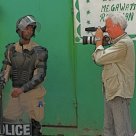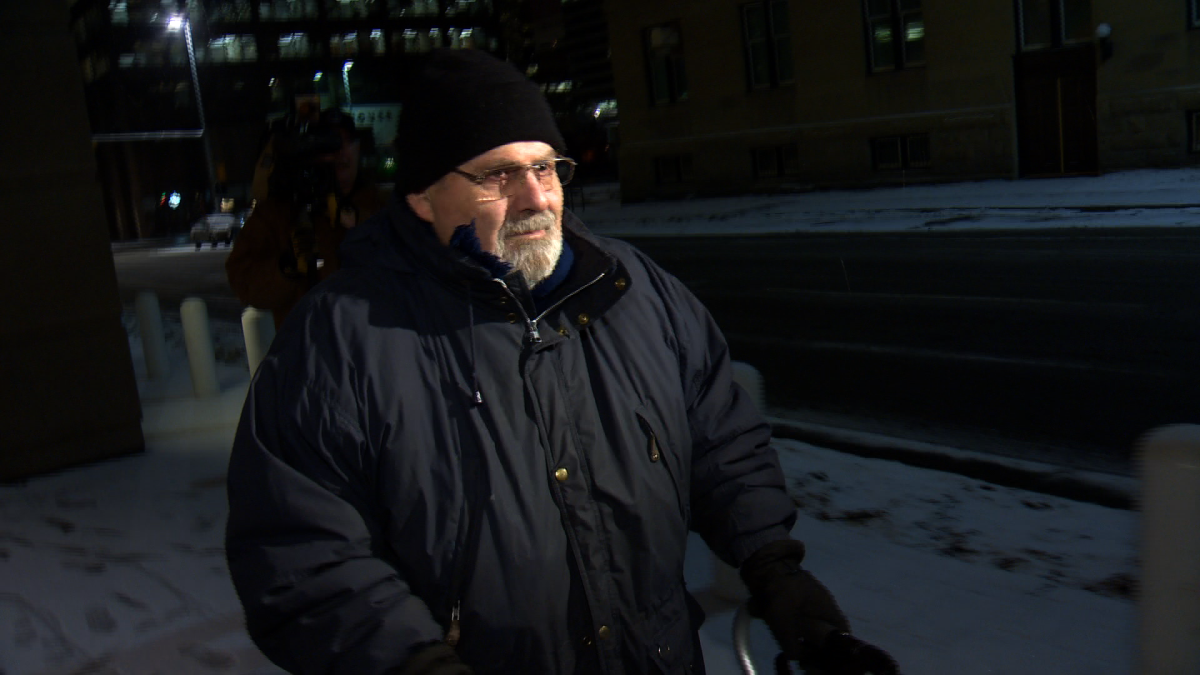The Calgary judge who sentenced Dr. Aubrey Levin to five years in prison for sexual assault used blunt language in her summation. Justice Donna Shelley said Levin was guilty of “horrible violations of trust” and that he had acted in a “predatory” manner.

Which leaves an important question unanswered: how did Levin manage to operate under the radar in Alberta for 12 years —trusted by justice officials, the academic community and the body that licenses doctors? As crown prosecutor William Wister said in an interview after the trial: “it’s a question of, does the right hand know what the left hand is doing?”
Calgary lawyer Richard Edwards, who represents one of Levin’s accusers, says authorities should have taken a closer look at Levin’s track record, both in Canada and in his native south Africa—a background that raises a number of “red flags” about his medical ethics and practices.
A timeline of the Aubrey Levin story highlights some of those red flags.
June 10, 1964: Aubrey Levin registers as a medical practitioner with the South African Medical and Dental Council.
Feb, 28, 1968: A 29-year-old Dr. Aubrey Levin submits a handwritten letter to the Secretary of the South African Parliament in Cape Town, asking to appear before the Select Committee on the Immorality Amendment Act, to offer his proposals on how to “treat” homosexuals and lesbians. “The problem of sexual deviation,” he writes, “requires re-evaluation; without encouraging an unnatural extention (sic) of this problem, it would be better contained and treated by the doctor (rather than by imprisonment).”
- After controversial directive, Quebec now says anglophones have right to English health services
- Cineplex slapped with record $38.9M fine over online booking fee
- Michael Kovrig reflects on ‘brutally hard’ Chinese detention: ‘You’re totally alone’
- U.S. moves to ban Chinese software, hardware from all vehicles in America
1969: Levin registers with the South African Medical and Dental Council as a “specialist psychiatrist.”
1969—1974: Dr. Levin joins the South African Defence Force as a psychiatrist, principal grade, with the rank of Colonel. In 1971, he is named Team Leader in the SADF’s Drug Rehabilitation Program at One Military Hospital, in Pretoria. It is here that Levin develops his aversion therapy techniques for so-called “deviant” conscripts—recruits who are identified as homosexual or who smoked marijuana. The therapy includes exposure to electro-shock, and drug treatment. Dr. Levin also sporadically visits a military detention camp in northern South Africa, called Greefswald, a camp with a notorious reputation for the harsh treatment of conscripts.
1975—1995: Dr. Levin holds various hospital positions, along with consultancies, and for seven years, is Director of Mental Health in the Department of Health Services and Welfare.
April 27, 1994: The apartheid era formally ends in South Africa with the election of Nelson Mandela as president of a government of national unity,
1995: The South African government creates a Truth and Reconciliation Commission (TRC) to investigate violence and human rights abuses under apartheid. Dr. Levin leaves his clinical position at Fort England Hospital in Grahamstown and relocates to Saskatchewan. His successor, Dr. Sean O’Donoghue, says Dr. Levin “left in such a hurry he didn’t even pack up his office! (I had to post things to him in Canada . . . “). Later, Dr. Levin will claim he left South Africa because of his concerns over the high crime rate under the new government.

Get breaking National news
June 1997: The Health and Human Rights Project submits a report to the TRC naming Aubrey Levin as a key figure in the “torture” of gay men in the military, as part of a military scheme to “reprogramme” gay recruits with electric shock treatment. Levin says in a newspaper interview that aversion therapy was widely practiced at the time, that the shocks were mild, and that the patients consented.
December 31, 1997: Dr. Levin’s name is officially erased from the register of the South African Medical and Dental Council, at his request.
1997-98: Dr. Levin is licensed to practice medicine first in Saskatchewan, and later in Alberta. His CV makes no mention of the electro-shock work he did with homosexuals. Meanwhile, the TRC asks him to return to South Africa to testify in his health sector hearings, to respond to the claims in the HHRP submission. But Dr. Levin, through a lawyer, refuses and threatens legal action. The final TRC report does not identify him by name, erroneously referring only to a “psychologist” who practiced aversion therapy.
1998 : A doctor with the Health and Human Rights Project in South Africa sends a letter to the Alberta College of Physicians and Surgeons, mentioning the group’s concerns about Aubrey Levin’s background. There is no reply.
1998-2010: In a resume, Dr. Levin lists himself as a consultant to Corrections Canada, and he hosts weekly clinics at the Calgary Correctional Centre
1999: A document called the “Aversion Project” is published in South Africa. It provides an account of what happened in Ward 22 of One Military Hospital in Pretoria while Dr. Levin was chief psychiatrist. It includes detailed testimony from patients. Dr. Levin is NOT identified by name, but is referred to as “the Colonel.” A researcher with the project, Mikki van Zyl, says that under the terms of their funding, they were not permitted to identify specific doctors or patients.
1999: Dr. Levin is assigned to provide psychiatrist services to RB, a man imprisoned for driving under the influence and causing bodily harm. They meet in a federal prison. RB is diagnosed with a borderline personality disorder.
2002: RB is released on probation and he has his first court-ordered out-of-prison counseling session with Dr. Levin, at the latter’s office at the Peter Lougheed Centre. Later, RB will claim that this is where the first sexual assault took place.
2003: The world premiere in South Africa of the documentary “Property of the State: Gay Men in the Apartheid Military” includes an interview with Michael Smith. Smith, a homosexual, describes in detail an electro-shock session administered by Dr. Levin.
2004: A patient of Dr. Levin at the Peter Lougheed Centre tells an administrator at the hospital that he felt “uncomfortable” during a session with Dr. Levin. Dr. Thomas Mackay, Dr. Levin’s immediate superior, cautions him that physical exams of a patient should only take place with a third person present. No further action is taken.
2006: Dr. Levin is appointed professor of clinical psychiatry at the University of Calgary.
March 4, 2009: Dr. Levin sees a patient, WG, who is referred to him by a family doctor. WG says that while discussing STDs and intimacy problems, Dr. Levin grabbed his penis and testicles with his right hand and began a “jerking” motion. WG says he angrily fled the room and reported the incident to his mother and to police, and to his doctor shortly after.
December 2009-March 2010: GP, a cancer patient in remission, has three sessions with Dr. Levin. They discuss sexual dysfunction. GP later testifies that Dr. Levin fondled him and clenched his penis.
March 2010: Upset about what he called repeated assaults, patient RB buys a wristwatch with a hidden camera and on two different dates—March 3rd and 16—he secretly videotapes Dr. Levin touching his genitals. RB gives the tapes to his criminal lawyer. The tapes are passed on to police.
March 23, 2010: Arrested and charged with the sexual assault of RB, Dr. Levin tells a Calgary detective during a five-hour meeting that he was treating RB for erectile dysfunction.
July 2010: Police announce that 20 other men have come forward, claiming they were assaulted by Dr. Levin during counseling sessions.
October 11, 2012: Dr. Levin goes to trial at the Court of Queen’s Bench in Calgary. The Crown decides to go ahead with nine of the original 21 cases. During the trial, a jury is shown the graphic secretly-recorded video of Dr. Levin touching RB.
January 28, 2013: A jury of 11 men and women finds Dr. Levin guilty of three counts of sexual assault, against patients RB, WG and GP. They find him not guilty of two other counts, and are deadlocked on the remaining four cases. Justice Donna Shelley sentences Levin to five years in prison. Levin’s lawyer says he will appeal. The Crown says the four deadlocked cases will be retried, probably in early 2014.
February 7, 2013: Police arrest Dr. Levin’s wife Erica, 69, and charge her with obstruction of justice alleging she attempted to bribe a juror in the Levin trial. The juror said she was approached on a train platform in January and offered $1000 or $10,000 in a white envelope, to bring in a not-guilty verdict. The juror informed police and was subsequently dismissed.
February 13, 2013: Dr. Levin is released on $15,000 bail. The judge says that, since his license to practice medicine has been suspended, he is “not a danger to the public.”








Comments